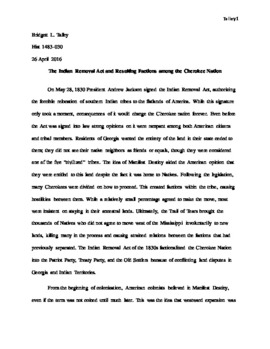| dc.contributor.author | Talley, Bridgett | |
| dc.creator | Talley, Bridgett | |
| dc.date.accessioned | 2016-07-11T19:35:25Z | |
| dc.date.accessioned | 2021-04-14T15:26:29Z | |
| dc.date.available | 2016-07-11T19:35:25Z | |
| dc.date.available | 2021-04-14T15:26:29Z | |
| dc.date.issued | 2016 | |
| dc.identifier.uri | https://hdl.handle.net/11244.46/98 | |
| dc.description | David W. Levy Prize winner | en-US |
| dc.description.abstract | On May 28, 1830 President Andrew Jackson signed the Indian Removal Act, authorizing the forcible relocation of southern Indian tribes to the flatlands of America. While this signature only took a moment, consequences of it would change the Cherokee nation forever. Even before the Act was signed into law strong opinions on it were rampant among both American citizens and tribal members. Residents of Georgia wanted the entirety of the land in their state ceded to them; they did not see their native neighbors as friends or equals, though they were considered one of the five “civilized” tribes. The idea of Manifest Destiny aided the American opinion that they were entitled to this land despite the fact it was home to Natives. Following the legislation, many Cherokees were divided on how to proceed. This created factions within the tribe, causing hostilities between them. While a relatively small percentage agreed to make the move, most were insistent on staying in their ancestral lands. Ultimately, the Trail of Tears brought the thousands of Natives who did not agree to move west of the Mississippi involuntarily to new lands, killing many in the process and causing strained relations between the factions that had previously separated. The Indian Removal Act of the 1830s factionalized the Cherokee Nation into the Patriot Party, Treaty Party, and the Old Settlers because of conflicting land disputes in Georgia and Indian Territories. | en_US |
| dc.language.iso | en_US | en_US |
| dc.rights | Attribution-NonCommercial-ShareAlike 3.0 United States | * |
| dc.rights.uri | https://creativecommons.org/licenses/by-nc-sa/3.0/us/ | * |
| dc.subject | David W. Levy Prize Winner | en_US |
| dc.subject.lcsh | United States. Indian Removal Act of 1830 | |
| dc.subject.lcsh | Cherokee Nation -- Politics and government | |
| dc.subject.lcsh | Cherokee Indians -- Politics and government | |
| dc.title | The Indian Removal Act and resulting factions among the Cherokee Nation | en_US |
| ou.course.dept | HIST | en_US |
| ou.course.number | 1483 | |
| dc.contributor.sponsor | Kruer, Matthew | |
| dc.contributor.sponsor | Myers, Leroy | |
| dc.description.undergraduate | undergraduate | |

